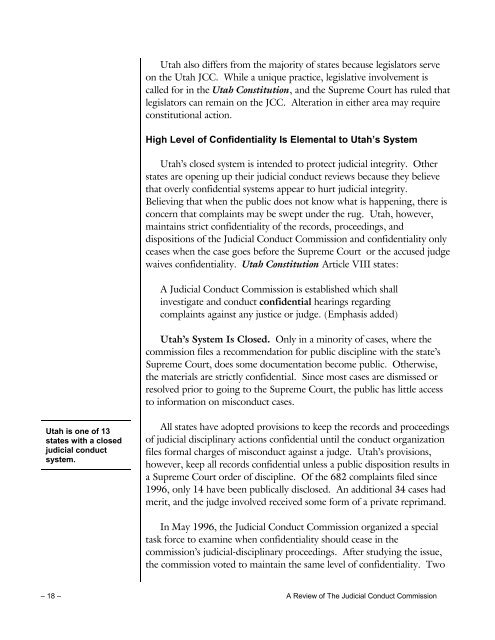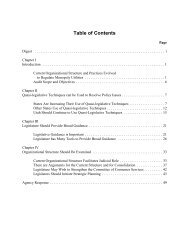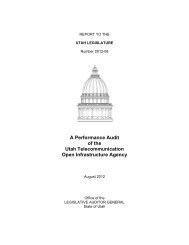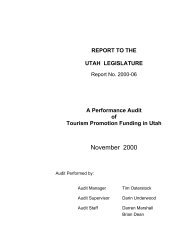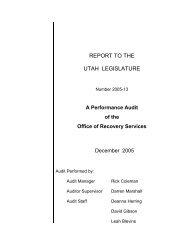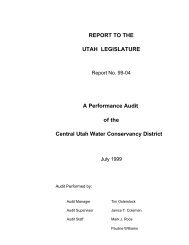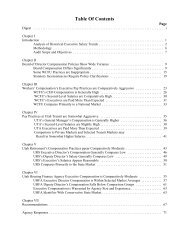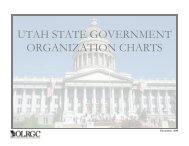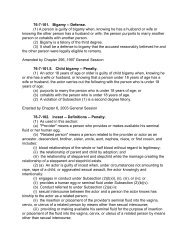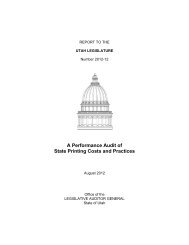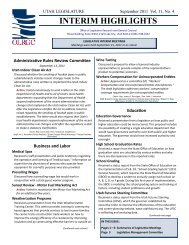A Review of the Judicial Conduct Commission - Utah State Legislature
A Review of the Judicial Conduct Commission - Utah State Legislature
A Review of the Judicial Conduct Commission - Utah State Legislature
You also want an ePaper? Increase the reach of your titles
YUMPU automatically turns print PDFs into web optimized ePapers that Google loves.
<strong>Utah</strong> also differs from <strong>the</strong> majority <strong>of</strong> states because legislators serveon <strong>the</strong> <strong>Utah</strong> JCC. While a unique practice, legislative involvement iscalled for in <strong>the</strong> <strong>Utah</strong> Constitution, and <strong>the</strong> Supreme Court has ruled thatlegislators can remain on <strong>the</strong> JCC. Alteration in ei<strong>the</strong>r area may requireconstitutional action.High Level <strong>of</strong> Confidentiality Is Elemental to <strong>Utah</strong>’s System<strong>Utah</strong>’s closed system is intended to protect judicial integrity. O<strong>the</strong>rstates are opening up <strong>the</strong>ir judicial conduct reviews because <strong>the</strong>y believethat overly confidential systems appear to hurt judicial integrity.Believing that when <strong>the</strong> public does not know what is happening, <strong>the</strong>re isconcern that complaints may be swept under <strong>the</strong> rug. <strong>Utah</strong>, however,maintains strict confidentiality <strong>of</strong> <strong>the</strong> records, proceedings, anddispositions <strong>of</strong> <strong>the</strong> <strong>Judicial</strong> <strong>Conduct</strong> <strong>Commission</strong> and confidentiality onlyceases when <strong>the</strong> case goes before <strong>the</strong> Supreme Court or <strong>the</strong> accused judgewaives confidentiality. <strong>Utah</strong> Constitution Article VIII states:A <strong>Judicial</strong> <strong>Conduct</strong> <strong>Commission</strong> is established which shallinvestigate and conduct confidential hearings regardingcomplaints against any justice or judge. (Emphasis added)<strong>Utah</strong>’s System Is Closed. Only in a minority <strong>of</strong> cases, where <strong>the</strong>commission files a recommendation for public discipline with <strong>the</strong> state’sSupreme Court, does some documentation become public. O<strong>the</strong>rwise,<strong>the</strong> materials are strictly confidential. Since most cases are dismissed orresolved prior to going to <strong>the</strong> Supreme Court, <strong>the</strong> public has little accessto information on misconduct cases.<strong>Utah</strong> is one <strong>of</strong> 13states with a closedjudicial conductsystem.All states have adopted provisions to keep <strong>the</strong> records and proceedings<strong>of</strong> judicial disciplinary actions confidential until <strong>the</strong> conduct organizationfiles formal charges <strong>of</strong> misconduct against a judge. <strong>Utah</strong>’s provisions,however, keep all records confidential unless a public disposition results ina Supreme Court order <strong>of</strong> discipline. Of <strong>the</strong> 682 complaints filed since1996, only 14 have been publically disclosed. An additional 34 cases hadmerit, and <strong>the</strong> judge involved received some form <strong>of</strong> a private reprimand.In May 1996, <strong>the</strong> <strong>Judicial</strong> <strong>Conduct</strong> <strong>Commission</strong> organized a specialtask force to examine when confidentiality should cease in <strong>the</strong>commission’s judicial-disciplinary proceedings. After studying <strong>the</strong> issue,<strong>the</strong> commission voted to maintain <strong>the</strong> same level <strong>of</strong> confidentiality. Two– 18 – A <strong>Review</strong> <strong>of</strong> The <strong>Judicial</strong> <strong>Conduct</strong> <strong>Commission</strong>


